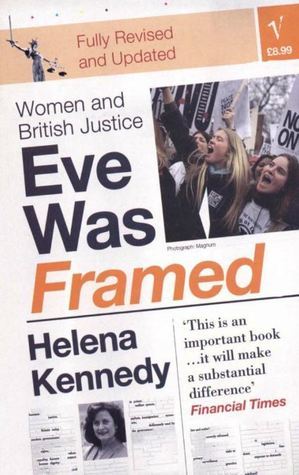What do you think?
Rate this book


320 pages, Paperback
First published October 7, 1992
Treating equally those who are unequal creates further inequality
[in 1991] a retired Appeal Court judge explained that if it were open to wives to bring prosecutions against rape, albeit against a background of domestic violence, it would prohibit any chance of rehabilitation of the marriage and would have a deleterious effect on children - as though rape itself, rather than the prosecution, might not already have had that effect. Precisely these arguments about 'irreparable damage to the family' have been used to counter the introduction of every piece of reforming legislation for the benefit of women in the last hundred years.
The writer Ann Oakley has pointed out that the dividing line between what is masculine and what is criminal is at times a thin one; assertiveness and independence are seen as exclusively male characteristics, and when displayed by young black women are seen as indicative of 'trouble'
If I were to discuss the book purely based on its content, I'd reach the harsh conclusion that it could have been better. That's not to say the book is not worth reading since it contains its more than fair share of 'inside stories', analysis and theoretical accounts.
But I found myself reading some sentences twice due to the absurdity of some of Kennedy's allegations. It is not enough to say 'no'. Men hear a challenge to their masculinity in the sound. As a person who has read widely on the topic of feminism, I can say that there are far more complex articles or books that don't include such radical opinions and still have a point. Because, honestly, we cannot argue that all men react in the same way to the same event, especially when talking about their feelings. Kennedy seems to want to make topics like men and psychology seem easy when, in fact, they're not.
However, I can understand why Helena Kennedy would want to write 'extra'; back in 2005, when the book was released, feminism was not as prevalent as it is today so I gather it took a lot more convincing to make people believe that our society faces some issues. After all, most of the people are into feminism nowadays because the subject is popular. And rightly so. But this means that we should admire even more people like Helena Kennedy who dared to bring up crucial topics like feminism when such issues were not nearly as popular as they are today.
"Police, lawyers and judges still have difficulties in abandoning their stereotype of the abused woman as someone who is submissive and cowed. When the woman appears competent or has a bit of gumption or if she seems to be materially well-off, there is a failure of the imagination as to how she could be victimised. Lawyers still say of a battered woman 'She is a middle-class woman. It is not as though she could not afford alternative accommodation.'"
"Viscount Bledisloe chose an unfortunate but telling example from which to draw the principle: 'If I am accused of stealing your property, it is a defence if I show an honest belief that I had a claim of right to that property. That is the general test of the criminal law.'"